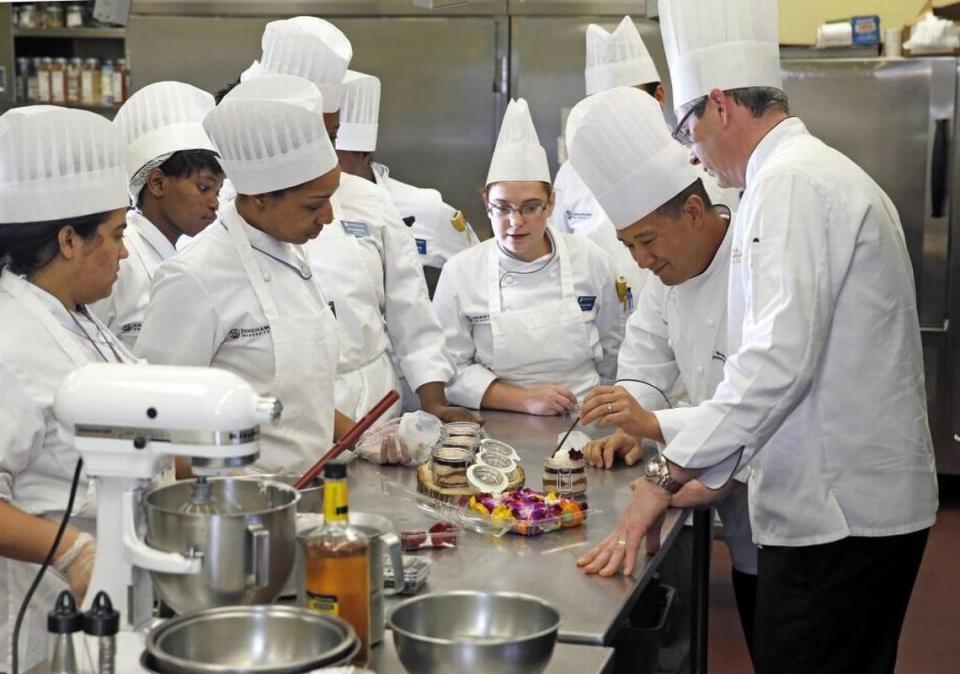Johnson & Wales, which trained many local chefs, is closing its North Miami campus
After 28 years in South Florida, Johnson & Wales University is shutting down its North Miami campus in 2021, according to a letter from the private school’s Board of Trustees.
Johnson & Wales, known for its culinary school and other hospitality programs, announced Thursday it is also closing its Denver campus as part of a move to “consolidate the university’s physical footprint.” The university is striving to have a larger online presence across a broader spectrum of academic programs.
The closure of the North Miami campus could impact up to 1,310 enrolled students and nearly 200 faculty and staff. While enrolled students will be allowed to continue their studies until the summer of 2021, the end of this upcoming academic year, the campus will not be accepting any new applicants.
For those graduating after the May 2021 closure, students will have the option to transfer to one of Johnson & Wales remaining campuses in Providence, Rhode Island, or Charlotte, North Carolina, or finish remotely over online classes.

Part of the reason for the two-campus closure is that neither of them were set to meet financial goals established by the university’s Board of Trustees by 2022, said Johnson & Wales’ board chair James H. Hance Jr. and Chancellor Mim L. Runey.
“Now that we are midway through the plan, it has become clear that in spite of all of their efforts, by the end of 2022, the North Miami and Denver campuses will not be able to achieve the goal to be self-sustaining,” said the letter, signed by Hance Jr. and Runey.
“To succeed, JWU must continue to evolve from its niche status in hospitality and culinary arts to become a comprehensive university.”
Emmanuel Cabrera Muñoz, a spokesman for the JWU North Miami campus, said the Board of Trustees made the decision on Tuesday and that the financial strain caused by COVID-19 “was one of the many factors considered.” Cabrera Muñoz did not say what will happen to the campus.
The North Miami campus first opened in 1992, taking over an abandoned hospital and slowly expanding to 28 acres of land that the university acquired over time. The campus has 18 buildings, seven of which are residence halls. Undergraduate tuition costs about $34,000 an academic year.
Along with Florida International University’s hospitality school, Johnson & Wales was an employment pipeline, feeding students and graduates to South Florida restaurants and hotels.
The school’s announcement caught everyone in the community by surprise, including North Miami city council member Scott Galvin, who represents the area and lives about a block from the school at 1701 NE 127th St. He said he learned of the closure after a friend posted about it on Facebook on Thursday morning and was shocked.
“They’ve been an incredible friend to the community over 20+ years, always cooking for city events, having elementary school kids who came in and toured,” said Galvin, adding that he doesn’t yet know what will happen to the school once the buildings are emptied out.
“It’s going to be a really tough loss,” he said.
Najai Martinez, a rising senior at Johnson & Wales North Miami and the president of the JWU Student Government Association, said she was equally disappointed when she read the announcement.
“The class of 2021, we don’t have a home campus to go to anymore as alumni,” she said. “But I have so much pride in my school. I want my JWU North Miami community to know that at the end of the day we are still Wildcats.”

Martinez, 23, left the campus in a rush toward the end of her junior spring trimester in March, not knowing that after many months of an ongoing health pandemic, she would end up losing her alma mater, too.
“It’s kind of sad that we didn’t get to say our goodbyes,” said Martinez, who fears that she will not get a chance to go back to the campus. “When we left, we really didn’t know what the state of our campus was going to be. I think a lot of people didn’t expect an announcement that it would shut down.”
Martinez said she’s received dozens of messages from disoriented students — mainly freshmen and sophomores — wondering how they will complete their studies.
Perhaps one of the university’s most well-known alums is Michelle Bernstein, one of Miami’s most prominent chefs, and part of the first 25-student class to enroll at the North Miami campus. Her 1992 graduating class had about eight people.
“What I got from it, which is kind of what you get from everything if you have the desire,” Bernstein said, “is they had everything I needed to learn, to really learn what it was that I needed just to get going.”

JWU’s closure follows the closure of other culinary schools around the country, at a time when many in the hospitality industry are facing a daunting job market.
The leisure and hospitality industry saw record losses in April and March, with nearly half of all workers — 7.7 million — being laid off, according to the Bureau of Labor Statistics. The restaurant sector, the hardest hit in the industry, is expected to lose $240 billion in sales and 5.5 million jobs by the end of 2020, according to data collected by the National Restaurant Association.
But the nationwide loosening of stay-at-home restrictions in May did bring back more than 1.4 million restaurant jobs in May, according to the Labor Bureau. Florida was the second state, after Texas, to add the most jobs, with more than 118,000 returning to work in the Sunshine State.
“We plucked so many great people and talent from that school and I’m scared that as they’re fading, [so] are the great cooks of the future,” said Bernstein, who owns the popular Little Havana lounge, Café La Trova.
Equally affected are the nearly hundreds of faculty and staff members who will lose their jobs come next year and were caught off guard by the announcement.
“It’s kind of surreal in a sense for me,” said Daniel Radice, an assistant coach for two of the university’s soccer teams. “I have kids so as much of a shock as it can be, I gotta start figuring out solutions.”
Radice, 33, said he loves working at the school, with its diverse student body. The soccer teams had to cancel their spring season in the middle of the pandemic.
“As long as I can be there, as long as they need my assistance, I’m going down with the ship,” he said.
Listen to today's top stories from the Miami Herald:

